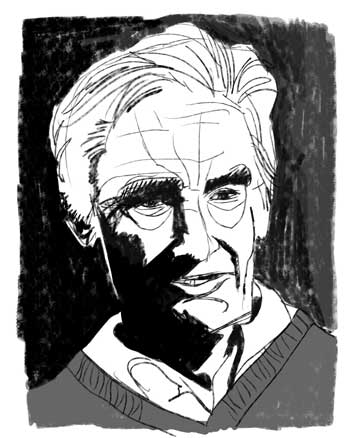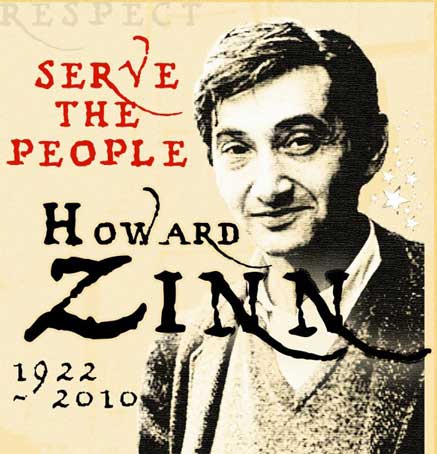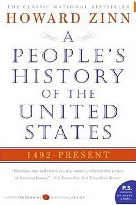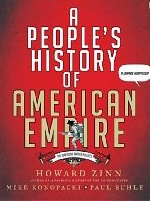‘I want to be remembered as somebody who gave people a feeling of hope and power that they didn't have before’
Howard Zinn
August 24, 1922-January 27, 2010Predictably enough, when controversial historian Howard Zinn died of a heart attack on January 27 while in California on a speaking tour, the left was too uncritical in assessing the life’s work of the author of the million-selling People’s History Of the United States, and the right was all too eager to drop firebombs all over it. The most egregious offender on either side was National Public Radio, generally regarded as at least left leaning in its politics—even though it is all too eager to bring on representatives from the right to recite the all-too-familiar GOP response to any idea put forth by President Obama or other Democrats, with little or no pushback from its hosts, in an odd display of balance. In a four-minute piece by Allison Keyes, two effusively pro-Zinn sources were quoted, along with the virulent Zinn detractor and right wing firebrand, David Horowitz. “There is absolutely nothing in Howard Zinn’s intellectual output that is worthy of any kind of respect,” Howard told NPR. “Zinn represents a fringe mentality which has unfortunately seduced millions of people at this point in time. So he did certainly alter the consciousness of millions of younger people for the worse.” Listeners who may have been unfamiliar with Zinn’s work or positions were ill-served by all the sources quoted in the NPR story.
The Independent, a young British tabloid (it began publishing in 1986), got it right, pointing out that Zinn’s portrayal of American icons of business and politics as “a litany of unfettered power-abusing and exploitation of the poor, people of colour, immigrants, workers, and all the disenfranchised who had lacked a voice in mainstream histories” had made him a polarizing figure, beloved among the left, despised on the right, and a black sheep among many professional historians (he was fond of noting that The People’s History was completely ignored by the most important journal of professional historians, but reviewed favorably in the New York Times, Washington Post and other major daily newspapers in the U.S. and abroad).
In Zinn’s defense the Independent noted that the academic/activist “insisted his book was one small counterweight to the overwhelming bias of mainstream history toward the political, economic, and social elites, and its implicit assumption of idealistic nationalism, capitalism, and imperialism. His refusal to credit the likes of Jefferson, Lincoln, or the Roosevelts with progressive achievements, while highlighting their shortcomings, infuriated mainstream ‘liberal’ historians, while his steadfast opposition to wars saw right-wingers targeted him as an ‘appeaser.’”
More important, in an era when too many of those in the public eye or with access to the mainstream media lack the courage of their convictions but can’t get enough of the spotlight, Zinn, as The Independent observes, “lived out the positions he argued. He opposed war as a decorated military flyer, championed labour as a former shipyard worker, and had risked jobs and jail protesting and working for civil rights and against the Vietnam war. Indeed, his willingness to ignore careerism appeared to infuriate many of his fellow academics as much as his insistence that meaningful change could only arise from the collective will of ordinary people, not heroic leaders. His views, and his passionate presentation of them, made him a favourite of successive younger generations.”
In addition to 20 books, Zinn wrote three plays, a memoir and upon his retirement from Boston University (on his final day, in 1988, he ended his last class early to join a picket line), remained in demand, especially on college campuses, as a lecturer and writer. His activism earned him the Eugene Debs, Thomas Merton and Upton Sinclair awards, and he was also awarded the Lannan literary prize. His wife of 50 years, Roslyn (the only person he allowed to read his books before he sent them off to his publisher), died in 2008. He is survived by two children, Myla Kabat-Zinn of Lexington, MA, and a son, Jeff Zinn of Lexington, MA; and five grandchildren.
To BigThink.com, a policy and ideas website, Zinn pronounced what may be his most fitting epitaph, in 2008. "I guess if I want to be remembered for anything it's for introducing a different way of thinking about the world, about war, about human rights, about equality,” he said.” Also, getting more people to realize the power which rests so far in hands of people with wealth and guns, that the power ultimately rests in people themselves and they can use it. And at certain points in history they have used it . . . . I want to be remembered as somebody who gave people a feeling of hope and power that they didn't have before."
David McGee
Remembering Howard Zinn
By Tom Hayden
Activist, former California State Senator(Tom Hayden, president of Students For a Democratic Society in 1962-63 and author of the New Left’s defining document, The Port Huron Statement, served in both the California State Assembly and the State Senate and on the front lines of the anti-war movement in the ‘60s, which led to his indictment on charges of conspiracy and incitement to riot as part of the “Chicago Seven,” along with David Dellinger, Bobby Seale, Abbie Hoffman, Jerry Rubin, Rennie Davis, John Froines and Lee Weiner. Currently teaching at Pitzer College in Claremont, CA, he also serves on the Advisory Board of Progressive Democrats of America, which works to “transform the Democratic Party and our country. We want to build a party and government controlled by citizens, not corporate elites—with policies that seve the broad public interest, not just private interests,”according to its website, www.pdamerica.org. In this remembrance of his friend Howard Zinn, Hayden offers the necessary balanced perspective lacking in much of the reporting of Zinn’s death and legacy. Reprinted with permission from the February 1, 2010 issue of The Nation magazine. Portions of each week’s Nation magazine can be accessed at http://www.thenation.com.)
Fifty years ago, with my wife Casey, I met the Zinns in Atlanta at the height of the student civil rights movement. Seventeen years older than I, Howard was a role model who defied the exception to the rule of not trusting anyone over 30. So was Roz, his wife, in that time of the feminine mystique.
The common notion in those days was that racial integration meant accepting black people into a closed white society. For Howard and Roz, integration also meant the reverse: that white people should seek acceptance in the segregated black world. So he taught at the all-black women's college, Spellman, where they lived on campus. He joined the movement, wrote about SNCC, and taught history with a fierce and friendly faith that it would make a difference. One of his students was Alice Walker.
Again and again Howard demonstrated these core values over the decades. He eventually was driven out of Spellman for supporting his students who protested segregation, as he later would be fired from Boston University for his stance on the Vietnam War and the system underlying it.
Howard Zinn discusses the impact on him of hearing Woody Guthrie’s song 'The Ludlow Massacre' and what he learned upon trying to discover the story behind the song.Late one night in 1967, I spent hours briefing Howard and Father Daniel Berrigan before they flew to Hanoi in defiance of the US government's prohibition against contact with "the other side." The professor and the poet were pursuing the truth of our time, while the diplomats and mainstream media were in denial or worse.
Then in the dawn of the seventies, he committed an even riskier act in the service of truth. He joined the underground network that protected Daniel Ellsberg and Anthony Russo as they released the classified Pentagon Papers which proved the Vietnam War to be an Official Lie.
How many of us are willing to be fired not once, but over and over again, for embodying our beliefs? There were a few, like our friend Staughton Lynd (with his wife, Alice), who also moved to Atlanta, worked with SNCC and ultimately was fired by Yale for his anti-Vietnam stance. There were some others, but not many.
Howard and Staughton were punished for being prematurely right about racism, the Vietnam War and the responsibility of intellectuals. In time, Howard was welcomed back to Spellman with honors and applause.
All the while, Howard was immersed in his Great Work, a thesis about the arc of American history being centered on the democratic reforms generated by wave after wave of social movements. His labor was long and painful, with no expectation of mainstream success. The drafts piled up, Roz often editing and arguing with Howard into the night. She was deeply moved by her debt to the feminist movement, which had been marginalized or neglected in the teaching of history, he by the lost stories of his immigrant working-class forebears.
As each version of the People's History seemed to be completed, Howard kept discovering deeper histories he hadn't known. Finally it began with the Indian resistance against the colonial settlers. It came to include the gay liberation movement, the disability rights movement and so on. The excavation and telling of the stories kept expanding the text.
While many in the academy quit in futility, or adjusted their earlier radicalism to become acceptable to committees of dinosaurs, Howard kept trying to forge an alternative to the dominant discourse, a people's history to stand against the established one. Perhaps it was the right moment. The sixties were over, the struggle over memory remained. The new generation of students made possible by civil rights and university reform embodied the very constituencies who were left out of the customary narrative. Campuses were bursting with struggles over new departments focusing on the lost histories of people of color, women and the left-outs, forced outs and dropped outs.
Howard Zinn gave us our lost heritage, and made us proud of it.
Howard Zinn: ‘I wish Obama would listen carefully to Martin Luther King’I remember listening to him one day, and the empowering inspiration I felt in my bones when he said, in his low, reasonable and utterly subversive voice, that the reason the government keeps so many secrets is simply that the government fears that the American people, not foreign conspirators, are their enemy.
Years later, he bought me lunch at a small restaurant by Harvard Square. "Let me pay for it. I can afford it now," he joked. As we sipped coffee and shared stories about our heart conditions, Harvard luminaries like Samantha Power kept dropping by the table to shake his hand. He was very aware of the irony of his late-life acceptance, bordering on adoration, in the ranks of the respected. Like many of his heroes and heroines in The People's History, Howard was becoming co-opted as an icon. The book kept selling, reaching one million copies this year. Then came documentaries, and the continuous spreading of the people's history is unlikely to stop. Howard's work has demolished the previous pillars of conventional wisdom, like Arthur Schlesinger's The Vital Center, the neoconservative's attempted restoration of the Victorian Age, and the aloof claims of intellectual postmodernism that there is no longer a unifying narrative.
Howard and I had our differences along the way. Howard grew up amidst the ideological struggles within the older Marxist left; on that spectrum, I think he would be classified as representing the Popular (non-communist) Front. He bombed Germany and became immersed in guilt over the civilian casualties he may have inflicted. As an early member of the New Left, these experiences were too distant to shape my life.
Howard didn't include the Students for a Democratic Society, the Port Huron Statement or "the sixties" as subjects of his people's history. He wrote me an anguished letter a few years ago promising to include that history in the next edition of his book, but time ran out. I would have been interested in his reflections on the demise, often self-generated, of those youthful organizations he tended to defend and support against their many detractors in the early sixties.His model of social movements was disdainful of electoral politics (well, maybe excluding Eugene Debs), while I served in the California legislature for eighteen years and supported Barack Obama. His criticisms were serious and legitimate: (1) that in voting for politicians, people were delegating away their own power; (2) that the political parties were shock absorbers that channelled popular rage into orderly channels; (3) that reforms and regulations were token concessions from the higher powers to placate and contain the potential for radical change; and (4) that all reforms were achieved through the pressure of more radical forces. No one can deny that these are the dominant patterns of American history, as his work amply demonstrated. Every community organizer and activist needs to read and absorb these lessons of The People's History.
But Howard embraced a model in which an undefined revolution lay on the horizon, and in which "the people" were inevitably betrayed after rising and rising over again. The very reforms that Howard himself risked his life and reputation for—the right to vote, the end of the Vietnam War—were seen by him as somewhat hollow. The labor reforms of the New Deal, the victory of women's suffrage, didn't really matter all that much, according to a careful reading of Howard's text. Reform always led back to the entrenchment of the establishment.
Howard Zinn on Civil Disobedience, from the documentary, You Can’t Be Neutral On a Moving Train; featuring Daniel Ellsberg, narration by Matt DamonIn The People's History, to be specific, Howard wrote favorably of Emma Goldman's statement that there was no reason to assume that women would be helped towards emancipation by the vote; that the Progressive Era was aimed at "quieting the popular rising" and "soothing protest," and that the two parties served as a "middle class cushion for class conflict." Reform was a "tactic of control." His history of the anti-Vietnam movement made no mention of any members of Congress who opposed the war, including then-Senator Mike Gravel who took a great risk in reading the Pentagon Papers into the Congressional Record.
We never fought much about these differences because the common ground, the experience, the respect and friendship between us was too binding. But I always thought it peculiar that The People's History is a tribute to permanent radicalism as an end in itself, one that takes little satisfaction in the single-issue victories that have motivated so many million Americans to unite and commit their energy and even their blood. It is possible to conclude from The People's History that the ruling class always prevails in the end, while the ordinary people primarily gain a measure of dignity. Howard typically acknowledged reforms only with understatements like this one: "undoubtedly ordinary people benefited to some extent from these changes."
He wasn't wrong, but perhaps underestimated the meaning of reform, as exemplified by the success of his own writings. His book is a mainstream foundation of a new and permanent approach to history, assigning agency to social movements. I have no doubt that Barack Obama, to take an example that might make Howard both appreciative and uncomfortable, is entirely familiar with Howard's writings, and I believe the president borrowed from The People's History in his campaign stump speech, which invariably ended with a tribute to social movements, a chain of struggle Obama described as passing "from hand to calloused hand," finally achieving so much that we revere and enjoy in American life. The paradox is that Howard never would have expected that The People's History could be appropriated to the purposes of an unlikely campaign to elect our first African-American president.
In the end, I believe that Howard's ideal was expressed by a poor immigrant like Nicolo Sacco who, with Bartolomeo Vanzetti, was framed and executed in 1927 when Howard was a tiny boy. In a letter from prison to his son Dante, quoted by Howard, Sacco the immigrant wrote: “But remember always, Dante, in the play of happiness, don't you use all for yourself only.... help the persecuted and the victim because they are your better friends.... In this struggle of life you will find more, and love and you will be loved.”
Radicalism itself was "the play of happiness" all through the long life of Howard Zinn. An abstraction like class consciousness was translated into his belief that the persecuted and the victims were his "better friends." In struggle itself, everyday life would be enriched. That he succeeded in this improbable quest is a lesson that should make the powerful nervous, and the rest of us so very grateful.
‘A People’s History of American Empire’
A promotional video for Howard Zinn’s last book, A People's History of American Empire: A Graphic Adaptation by Howard Zinn, Mike Konopacki, and Paul Buhle. Copyright © 2008 by Howard Zinn, Mike Konopacki, and Paul Buhle. Narration is by actor Viggo Mortenson.From the publisher’s website: “Howard Zinn, historian Paul Buhle, and cartoonist Mike Konopacki collaborated to retell, in vibrant comics form, a most immediate and relevant chapter of A People’s History: the centuries-long story of America’s actions in the world. Narrated by Zinn, this version opens with the events of 9/11 and then jumps back to explore the cycles of U.S. expansionism from Wounded Knee to Iraq, stopping along the way at World War I, Central America, Vietnam, and the Iranian revolution. The book also follows the story of Zinn, the son of poor Jewish immigrants, from his childhood in the Brooklyn slums to his role as one of America’s leading historians.”
A People’s History of the United States is available at www.amazon.com
A People’s History of American Empire is available at www.amazon.com
The documentary You Can’t Be Neutral On a Moving Train is available at www.amazon.com
Founder/Publisher/Editor: David McGee
Contributing Editors: Billy Altman, Laura Fissinger, Christopher Hill, Derk Richardson
Logo Design: John Mendelsohn (www.johnmendelsohn.com)
Website Design: Kieran McGee (www.kieranmcgee.com)
Staff Photographers: Audrey Harrod (Louisville, KY; www.flickr.com/audreyharrod), Alicia Zappier (New York)
E-mail: thebluegrassspecial@gmail.com
Mailing Address: David McGee, 201 W. 85 St.—5B, New York, NY 10024






